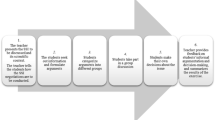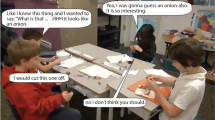Abstract
The present work examines the reasoning of 19 6th graders (12-year-old), who engaged in dialogic argumentation and reflective activities, on the topic of Genetically Modified Food. Results showed that participants considered more aspects of the socio scientific issue at the final assessment, as this was reflected in the greater diversity of arguments produced (e.g. social, ecological, ethical, economic, scientific), compared to the initial assessment. Participants also produced significantly more socio-scientific arguments, combing social and scientific issues in one argument rather than focusing on either the social or the scientific aspect of the issue, at the final assessment compared to the initial assessment. The present findings show that engagement in dialogic argumentation supported the development of students’ ability to consider alternatives, which is a fundamental skill for critical thinking. Finally, educational implications are discussed, and a case is made for the value of dialogic argumentation as a means for supporting critical thinking.
Access this chapter
Tax calculation will be finalised at checkout
Purchases are for personal use only
Similar content being viewed by others
Notes
- 1.
The data collection took place before the first cases of COVID-19 were reported.
References
Abrami, P. C., Bernard, R. M., Borokhovski, E., Waddington, D. I., Wade, C. A., & Persson, T. (2015). Strategies for teaching students to think critically: A meta-analysis. Review of Educational Research, 85(2), 275–314.
Barzilai, S., & Eshet-Alkalai, Y. (2015). The role of epistemic perspectives in comprehension of multiple author viewpoints. Learning and Instruction, 36, 86–103.
Baytelman, A., Iordanou, K., & Constantinou, C. (2020). Epistemic beliefs and prior knowledge as predictors of the construction of different types of arguments on socio-scientific issues. Journal of Research in Science Teaching. 57 (8), 1199–1227.
Bråten, I., Britt, M. A., Strømsø, H. I., & Rouet, J. F. (2011). The role of epistemic beliefs in the comprehension of multiple expository texts: Toward an integrated model. Educational Psychologist, 46(1), 48–70.
El Soufi, N., & See, B. H. (2019). Does explicit teaching of critical thinking improve critical thinking skills of English language learners in higher education? A critical review of causal evidence. Studies in Educational Evaluation, 60, 140–162.
Ennis, R. (2018). Critical thinking across the curriculum. Topoi, 37, 165–184.
Fisher, M., Knobe, J., Strickland, B., & Keil, F. C. (2017). The influence of social interaction on intuitions of objectivity and subjectivity. Cognitive Science, 41, 1119–1134.
Ghebreyesus, T. A., & Swaminathan, S. (2020). Scientists are sprinting to outpace the novel coronavirus. The Lancet, 395(10226), 762–764.
Hitchcock, D. (2015). The effectiveness of instruction in critical thinking. In M. Davies & R. Barnett (Eds.), The Palgrave handbook of critical thinking in higher education. Palgrave Macmillan.
Iordanou, K. (2010). Developing argument skills across scientific and social domains. Journal of Cognition and Development., 11(3), 293–327.
Iordanou, K. (2016a). From theory of mind to epistemic cognition. A lifespan perspective. Frontline Learning Research, 4(5), 106–119.
Iordanou, K. (2016b). Developing epistemological understanding through argumentation in scientific and social domains. Zeitschrift für Pädagogische Psychologie., 30(2-3), 109–119.
Iordanou, K. (2022). Supporting strategic and meta-strategic development of argument skill: The role of reflection. Metacognition and Learning. https://doi.org/10.1007/s11409-021-09289-1
Iordanou, K., & Constantinou, C. P. (2015). Supporting use of evidence in argumentation through practice in argumentation and reflection in the context of SOCRATES learning environment. Science Education, 99, 282–311.
Iordanou, K., Kendeou, P., & Michalinos, Z. (2020). Examining my-side bias during and after reading controversial historical accounts. Metacognition & Learning, 15(3), 319–342.
Iordanou, K., Kuhn, D., Matos, F., Shi, Y., & Hemberger, L. (2019a). Learning by arguing. Learning and Instruction., 63, 101–207.
Iordanou, K., Muis, K. R., & Kendeou, P. (2019b). Epistemic perspective and online epistemic processing of evidence: Developmental and domain differences. The Journal of Experimental Education, 87(4), 531–551.
Jiménez-Aleixandre, M. P., & Puig, B. (2012). Argumentation, evidence evaluation and critical thinking. In B. Fraser, K. Tobin, & C. McRobbie (Eds.), Second international handbook of science education. Springer.
Jiménez-Aleixandre, M. P., Bugallo Rodríguez, A., & Duschl, R. A. (2000). “Doing the lesson” or “doing science”: Argument in high school genetics. Science Education, 84(6), 757–792.
Κατερίνα Σακελλαροπούλου: Να βάλουμε το «εμείς» πάνω από το «εγώ» [Katerina Sakellaropoulou: Putting ‘we’ over ‘I’] (2020, March 24). Έθνος [Ethnos]. Retrieved from https://www.ethnos.gr/politiki/96135_katerina-sakellaropoyloy-na-baloyme-emeis-pano-apo-ego
Kalypso, I., & Deanna, K. (2020). Contemplating the opposition: Does a personal touch matter? Discourse Processes, 57(4), 343–359. https://doi.org/10.1080/0163853X.2019.1701918
Kienhues, D., Stadtler, M., & Bromme, R. (2011). Dealing with conflicting or consistent medical information on the web: When expert information breeds laypersons’ doubts about experts. Learning and Instruction, 21, 193–204.
Kuhn, D. (1999). A developmental model of critical thinking. Educational researcher, 28(2), 16–46.
Kuhn, D. (2019). Critical thinking as discourse. Human Development, 62(3), 146–164.
Kuhn, D., & Iordanou, K. (in press). Epistemology as a core dimension of cognitive development. In D. Dunning & N. Ballantyne (Eds.), Reason, bias, and inquiry: New perspectives from the crossroads of epistemology and psychology. Oxford University Press.
Kuhn, D., & Udell, W. (2003). The development of argument skills. Child Development, 74, 1245–1260.
Kuhn, D., Hemberger, L., & Khait, V. (2016). Argue with me: Argument as a path to developing students’ thinking and writing (2nd ed.). Routledge.
Kuhn, D., Goh, W., Iordanou, K., & Shaenfield, D. (2008). Arguing on the computer: A microgenetic study of developing argument skills in a computer-supported environment. Child Development, 79, 1311–1329.
Kuhn, D., Zillmer, N., Crowell, A., & Zavala, J. (2013). Developing norms of argumentation: Metacognitive, epistemological, and social dimensions of developing argumentive competence. Cognition & Instruction, 31, 456–496.
Lytzerinou, E., & Iordanou, K. (2020). Teachers’ ability to construct arguments, but not their perceived self-efficacy of teaching, predicts their ability to evaluate arguments. International Journal of Science Education. 42(4), 617–634.
Murphy, P. K., Rowe, M. L., Ramani, G., & Silverman, R. (2014). Promoting critical-analytic thinking in children and adolescents at home and in school. Educational Psychology Review, 26(4), 561–578.
Resnick, L. B., Asterhan, C. S. C., Clarke, S., & Schantz, F. (2018). Next generation research in dialogic learning. In G. E. Hall, L. F. Quinn, & D. M. Gollnick (Eds.), Wiley handbook of teaching and learning (pp. 323–338). Wiley-Blackwell.
Shi, Y. (2020). Talk about evidence during argumentation. Discourse Processes. 57(9), 770–792.
Trilling, B., & Fadel, C. (2009). 21st century skills: Learning for life in our times. Wiley.
Wagner, T. (2008). Even our “best” schools are failing to prepare students for 21st-century careers and citizenship. Educational leadership, 66(2), 20–25.
Wilkinson, I. A. G., Murphy, P. K., & Binici, S. (2015). Dialogue-intensive pedagogies for promoting reading comprehension: What we know, what we need to know. In L. B. Resnick, C. S. C. Asterhan, & S. N. Clarke (Eds.), Socializing intelligence through academic talk and dialogue (pp. 37–50). American Educational Research Association.
Zavala, J., & Kuhn, D. (2017). Solitary discourse is a productive activity. Psychological Science, 28, 578–586.
Author information
Authors and Affiliations
Corresponding author
Editor information
Editors and Affiliations
Rights and permissions
Copyright information
© 2022 The Author(s), under exclusive license to Springer Nature Switzerland AG
About this chapter
Cite this chapter
Iordanou, K. (2022). Supporting Critical Thinking Through Engagement in Dialogic Argumentation: Taking Multiple Considerations into Account When Reasoning About Genetically Modified Food. In: Puig, B., Jiménez-Aleixandre, M.P. (eds) Critical Thinking in Biology and Environmental Education. Contributions from Biology Education Research. Springer, Cham. https://doi.org/10.1007/978-3-030-92006-7_6
Download citation
DOI: https://doi.org/10.1007/978-3-030-92006-7_6
Published:
Publisher Name: Springer, Cham
Print ISBN: 978-3-030-92005-0
Online ISBN: 978-3-030-92006-7
eBook Packages: EducationEducation (R0)




